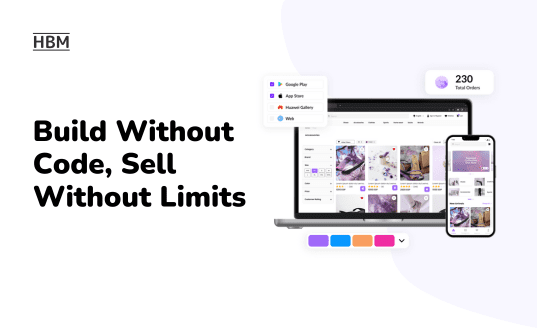Blog
Native vs. Hybrid vs. Cross-Platform App Development for Non-Developers
March 2, 2021 - 12 min. read

Do you have a new mobile app idea? Do you have an online service and you think the time is ripe for its phone app? Do you want to delve into the gaming world by having your own game app? Then it’s definitely an exciting time for you, and we wish you the best of luck!
However, it is also the time to start making some decisions when it comes to selecting the best way to develop this app. You don’t have to be a developer to want to have an app, so chances are if you’re not a developer, you’re now being introduced to some new terms and jargon that you may not have been exposed to before. And it’s fine.
There are generally three main options to pick from when it comes to mobile app development. The question here is not which one is the best one, but rather, which one is best for you. It’s similar to picking the right partner, because what’s best for someone else may not be what’s best for you, and vice versa (and also because it’s sort of a long term commitment). It all depends on your needs, requirements, and priorities.
Unlike picking a partner though, this here is something we can actually help you with. Which is why we’ve compiled a list of the various factors that can influence this decision, in simplified non-technical terms, and hopefully this can help you find the right one for you.
But first, let’s look into what each platform means to begin with.
Native Development
This is when you create an app that works for one platform only. It is created in a way where the programming language is native to this specific operating system. This leads to a fast and smooth mobile app, and the highest quality UI/UX. Also, for tens of thousands of downloads or hundreds of thousands of users, you definitely need native development. Most of the bigger apps around you are build using native programming (examples include: Facebook, Uber, Airbnb)
Cross-platform
This is when you use a third party tool to build the project. This tool would then “translate” the code into each platform’s native code or run the project behind a layer that takes care of bridging the gap. Popular games created with cross-platform frameworks include Fortnite, Angry Birds, Pokémon GO and PUBG.
Hybrid
This is when you use a third-party framework to build a web app that attempts to look and behave like a native app. This means that the app is developed once, but since it runs inside a browser, it comes at the cost of negatively impacting its security, performance, and user experience. It’s also risky since it’s dependent on a third party to keep maintaining their framework.

If this still doesn’t make much sense, it’s all good, we got you covered.
The next part here is where you can work by prioritizing.
We’ve gathered the most important factors that can come into play when deciding which platform to use, so based on your requirements and needs, you can ultimately make the decision that works best for you.
How important is user interface and user experience for your business model?

Generally, User interface and User Experience can make or break most apps. It is basically how users interact with your app, and how they feel about it. In short, this is what determines whether users are satisfied with the app or not.
With that said, not all business models are the same, which means that priorities differ. While some apps may value UI/UX above all, others really don’t need to invest that much in the experience, so it really all depends.
But let’s say that the user experience is at the top of your list.
- Your go-to would be native because it provides for the best quality experience.
However, you might not have the budget to go native, yet you do still care about the experience. If that’s the case, then either go for native and start by launching one platform, or lessen the features in the beginning until your business launches. - Otherwise, cross-platform would be the next best thing.
Do keep in mind that it is more difficult to optimize the app for each platform, they can’t always be made to behave or look like other native apps on each platform, and provides less control over unique device features. However, there are workarounds to have an almost seamless experience for users with cross-platform, but you might want to pay extra attention to the capabilities of your developer. - It’s another story if you’re building AR or VR experiences or when building full screen games.
In which case you go for cross-platform since they don’t usually make use of each platform’s native look and feel. (Is this a part of your app? Get a quote on Augmented Reality AR or Virtual Reality VR apps at 34ML)
If UI/UX is an absolute priority for the success of your app, then native is your safest bet. It also has the added benefit of making use of newly released features, without having to wait for third-party hybrid framework providers to update their frameworks so you add support for those features. This means your users will always have up-to-date apps.
Does your app include some hardware functionalities?

Will your app need to access any of the phone’s hardware?
- If your answer is yes.
Then it depends on which options you’ll want to access, but generally hybrid is the most restricted in terms of hardware functionality. Obviously native is the best option because it’s catered for each platform, but cross-platform is also a very good substitute to use here.
While you might be able to access most of the common hardware functionalities with either option, native allows for the most seamless experience.
What’s your budget?

This is actually one of the most important questions, but based on your priorities, you can still end up with the app of your desire with the right solution.
- Want to go native, and don’t have the budget?
If you’re operating on a tighter budget, don’t fret. This doesn’t mean you have to forgo the idea of a native app. There are solutions like launching with one platform first which is better for testing and easier to manage and will save on cost. Another option will be not going all out on your app features in the beginning. (for more tailored solutions, contact 34ML here) - The budget is there, but you’re not sure which to use?
Native is definitely your go to in general, unless you’ll be working with AR or VR experiences, then cross-platform may be best used here.
Conclusion: start by seeing if you can find solutions to go native. If these still don’t fit into your budget, then go for cross-platform or hybrid. The goal in the end for you is not to compromise on quality, so keep in mind your long-term vision as well.
How soon do you need to launch?

Of course, when we’re on the brink of launching our new baby, the excitement can push us to want to see it come to life as soon as possible.
But, answer this question wisely because these decisions are potentially long term.
This is actually one of the most important questions, but based on your priorities, you can still end up with the app of your desire with the right solution.
- You can afford a little extra time until launch.
Native development might take more time since you’re building two separate platforms, but it’s a small price to pay when weighed against quality. - If you’re tight on time, assess how soon is “soon” for you.
If it has to be like, now, then going for hybrid will allow you to be out there the fastest. You’ll be building the core part of the app using web technologies so it’s less development time and effort.
Cross platform would make you launch sooner than native, but still slower than hybrid. However, you might also want to factor in on your long term plan, so you don’t end up having to completely change down the line. (case study: Airbnb)
Have you guessed what our general preference is yet? What can we say, we’re geeks at heart, and enjoy working with native apps!
If you need further help with any questions regarding specific app solutions that are more technically related, or just generally want to know what would work best for your specific app, with your vision, then feel free to contact us for a consultation at info@34ml.com
To know more about us 34ml.com



